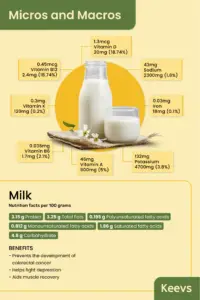Vitamins in Milk: Health Benefits of Milk You Need to Know

Milk is a liquid food that is enough to nourish a baby in the first few months of being born. One can only imagine how nutritious milk can actually be!
Walking out of the house without finishing your glass of milk was what often got us all in trouble as kids.
However, it is because of our regular consumption of milk that we are now hail and healthy!

Is milk your best friend yet?
Milk is best described as a ‘liquid food ‘. Babies of all mammals rely on their mother’s milk for a good year before transitioning to solids or other foods.
White and tasteless, this liquid food is packed with nutrients. Consume it as is, or use it to make other ingredients like paneer, cheese, etc., it will still retain almost all of its nutritional value.
We ideally consume cow’s milk for daily usage.
For other products like ghee and yogurt, we use different variants like buffalo and goat milk; this is due to the different levels of fat found in them.
The cow’s milk we consume is pasteurized and homogenized to increase shelf life and ensure good quality.
| India is the world’s largest producer of milk. Around 40% of the milk in the world is sourced from India. |
A popular myth that surrounds the consumption of milk is that it is fattening.
Often, people trying to lose weight cut dairy out of their diet. This can have adverse effects on your health since dairy products, especially milk, have various health benefits that you could be restricting your body from availing. (1)
Would you cut dairy from your diet?
| I’m uncertain :/ | NO! Dairy is going nowhere! |
If you said you’re uncertain, let me run you through the various benefits that come with the consumption of milk.
Milk is an excellent source of various vitamins and minerals. It is especially a great source of Vitamin D and Calcium.
Consuming at least one glass a day can reduce your chances of developing osteoporosis and help maintain your cardiovascular health!
What are the vitamins in milk?
We spoke about vitamin D and calcium, but what are the other vitamins in milk and how do they enrich our body?
If it is known as one of the most nutritious foods and is the only food you can survive solely on, there must be more to it than just vitamin D and calcium.
Let’s find out if milk is truly as nutritious as it claims to be!
The following are vitamins and minerals found in 100ml of whole milk, according to the USDA. (2)
| Vitamins and Minerals | Content in 100ml | RDA (% of total RDA) |
| Vitamin B12 | 0.45 mcg | 2.4 mcg (18.75%) |
| Vitamin D | 1.3 mcg | 20 mcg (6.5%) |
| Vitamin A | 46 mcg | 900 mcg (5%) |
| Vitamin B6 | 0.036 mg | 1.7 mg (2.1%) |
| Vitamin K | 0.3 mcg | 90 mcg (0.3%) |
| Calcium | 113 mg | 1000 mg (11.3%) |
| Phosphorus | 84 mg | 700 mg (12%) |
| Potassium | 132 mg | 3400 mg (3.7%) |
| Zinc | 0.37 mg | 13 mg (2.8%) |
| Magnesium | 10 mg | 420 mg (2.3%) |
| Sodium | 43 mg | 2000 mg (2.15%) |
| Copper | 0.025 mg | 0.9 mg (2.77%) |
| Iron | 0.03 mg | 18 mg (0.16%) |
| Manganese | 0.004 mg | 4 mg (0.1%) |
| Selenium | 3.7 mcg | 40 mcg (0.006%) |
That’s about it for all the vitamins and minerals, and gosh, was that a long list!
Now, what about our macros?
What other nutrients are found in milk?
There is more to the nutrients in milk than just the vitamins in milk.
It is enriched with various macros and micros.
We already discussed the micronutrients found in milk, so let’s take a look at what other nutrients are found!
The following are nutrition facts found in 100ml of whole milk according to the USDA. (2)
| Nutrients | Content in 100ml | RDA (% of total RDA) |
| Saturated fatty acids | 1.86 g | 30 g (6.2%) |
| Protein | 3.15 g | 52 g (6%) |
| Total lipid (fat) | 3.25 g | 77 g (4.2%) |
| Carbohydrate | 4.8 g | 130 g (3.6%) |
| Monounsaturated fatty acids | 0.812 g | 44 g (1.85%) |
| Polyunsaturated fatty acids | 0.195 g | 22 g (0.8%) |
With all of these nutrient facts on hand, cutting milk from your diet would not be your best choice.
It is rich in protein, calcium, healthy fats, and so many other micro and macronutrients!
Milk Nutritional Information
Nutrition Facts
Serving Size100g
- % Daily Value *
- Total Fat
3.25g
5%
- Saturated Fat 1.86g 10%
- Trans Fat 1.007g
- Sodium 43mg 2%
- Potassium 132mg 4%
- Total Carbohydrate
4.8g
2%
- Protein 3.15g 7%
- Vitamin A 46%
- Calcium 113%
- Iron 0.03%
- Vitamin D 1.3%
- Vitamin K 2%
- Vitamin B6 0.036%
- Vitamin B12 0.45%
- Phosphorus 84%
- Magnesium 10%
- Zinc 0.37%
- Selenium 3.7%
- Copper 0.025%
- Manganese 0.004%
* The % Daily Value tells you how much a nutrient in a serving of food contributes to a daily diet. 2,000 calories a day is used for general nutrition advice.
Other beneficial compounds
1. Riboflavin
Riboflavin, a compound found in milk, can help reduce migraines as well as prevent cancer.
Riboflavin might help prevent the DNA damage caused by carcinogens by acting as a coenzyme. (3)
2. K Casein
Casein is a milk protein that has various health benefits.
It has anticarcinogenic, immunomodulatory, antimicrobial, antihypertensive, and hypocholesterolemic properties. (4)
Health benefits of milk
We know milk is rich in various nutrients and can help maintain our cardiovascular health and prevent osteoporosis. However, up until now, we only discussed the benefits that come from the vitamins in milk along with other nutrients, and haven’t really gotten into their details. Let’s see how else it can benefit our body and overall health!
Milk,
1. Can protect one from developing colorectal cancer (5) (6)
Colorectal cancer is the third most common cancer worldwide. According to the World Cancer Research Fund, people who consume more than one serving of a dairy product, especially milk, have a reduced risk of developing colon cancer.
The presence of calcium plays a significant role in preventing the risk of developing colon cancer.
2. Can help fight depression (7) (8)
Vitamin D maintains the production of serotonin, a hormone that is often associated with moods, appetites, and sleep.
Inadequate levels of vitamin D can lead to insufficient brain serotonin synthesis.
Hence, studies have shown that maintaining good vitamin D levels can help fight this mental disorder; and because milk is enriched with vitamin D, we can say that a glass of milk a day can keep the blues away!
3. Can aid muscle recovery (9)
Adequate nutrition is required to facilitate the recovery process once an injury takes place. Protein and amino acids are essential in stimulating muscle protein synthesis that, in turn, aids recovery.
Cow’s milk is rich in lactose, a sugar found only in milk.
100ml of milk consists of 7.5g of lactose.
It is also rich in calcium, sodium, and potassium; these nutrients improve the hydration state of the muscles and therefore are essential during a recovery period.
| All these nutrients and vitamins in milk benefit our body and its functioning. It improves our heart health, bone health, prevents cancer, and can aid muscle recovery, while also ensuring a good production of serotonin, the happy hormone. |
How to consume milk?
Milk is a very common and not so demanding food item. It doesn’t require much preparation and is very easy and convenient to consume.
You can drink as is or use it to make various beverages like tea, coffee, milkshakes, smoothies, etc.
One might even consider milk the mother of all dairy products since you can use it to make paneer, yogurt, butter, ghee or clarified butter, and various other products.
Milk is also added to dishes like
- Rasmalai
- Pasta
- Rabdi, etc.
A substitute for milk if you are lactose intolerant or vegan are plant-based milk, namely:
- Soy milk,
- Almond milk
- Oat milk,
- Coconut milk, etc
How much milk should I consume in a day?
Milk should be a part of your diet to meet your body’s daily requirement of calcium, animal proteins, and vitamin B12.
Ideally, you should consume three cups, or around 732mL a day.
What if I consume too much?
Any food item, when consumed in excess, can be harmful to your body.
Although milk is highly nutritious, consuming too much can cause digestive issues, bloating, cramps, and diarrhea.
You should also ensure you’re not lactose intolerant before consuming any dairy product.
If your body cannot break down lactose properly, it will travel to your gut to be broken down by the gut bacteria; this could cause an uneasy feeling along with extreme gassiness and other digestive issues.
How to store milk?
Milk is best kept on the shelves of a refrigerator. The shelf life of milk is relatively less compared to other foods; its freshness lasts for a day or two if stored correctly.
The heat, and mixing of used milk with unopened milk, can contribute to spoilage.
Wrapping up
Milk is a nutrient-dense liquid food. It contributes to the overall wellbeing of our health if consumed in the right proportions.
From your physical state to your mental state, milk has got you covered!
Will you be consuming at least one glass of milk a day?
Let us know in the comments below!
References
- NIDDK. “Some Myths about Nutrition & Physical Activity.” 2017
- USDA. “Milk, whole, 3.25% milkfat, with added vitamin D.” FoodData Central, 2019
- NIH. “Riboflavin.” Health Information
- Seyed Hossein Davoodi,a,b Roghiyeh Shahbazi,c Saeideh Esmaeili,d Sara Sohrabvandi,d,* AmirMohamamd Mortazavian,e,* Sahar Jazayeri,e and Aghdas Taslimie. “Health-Related Aspects of Milk Proteins.” PMC, 2016
- Neil Murphy, 1 Teresa Norat, 1 , * Pietro Ferrari, 2 Mazda Jenab, 2 Bas Bueno-de-Mesquita, 3 , 4 Guri Skeie, 5 Anja Olsen, 6 Anne Tjønneland, 6 Christina C. Dahm, 7 , 8 Kim Overvad, 8 Marie Christine Boutron-Ruault, 9 , 10 Françoise Clavel-Chapelon, 9 , 10. “Consumption of Dairy Products and Colorectal Cancer in the European Prospective Investigation into Cancer and Nutrition (EPIC).” 2013
- Better Health Channel. “Milk.” 2020
- National Library of Medicine. “Vitamin D and the omega-3 fatty acids control serotonin synthesis and action, part 2: relevance for ADHD, bipolar disorder, schizophrenia, and impulsive behavior.” pubmed, 2015
- Sue Penckofer, Ph.D., RN, Joanne Kouba, Ph.D., RD, Mary Byrn, BSN, RN, and Carol Estwing Ferrans, Ph.D., RN, FAAN. “Vitamin D and Depression: Where is all the Sunshine?” 2011
- Juan M. A. Alcantara,corresponding author1 Guillermo Sanchez-Delgado,1 Borja Martinez-Tellez,1,2 Idoia Labayen,3 and Jonatan R. Ruiz1. “Impact of cow’s milk intake on exercise performance and recovery of muscle function: a systematic review.” 2019
![Blue Foods List [with pictures]](https://keevs.com/wp-content/uploads/2023/03/Blue-Foods-List-with-pictures-300x158.png)






